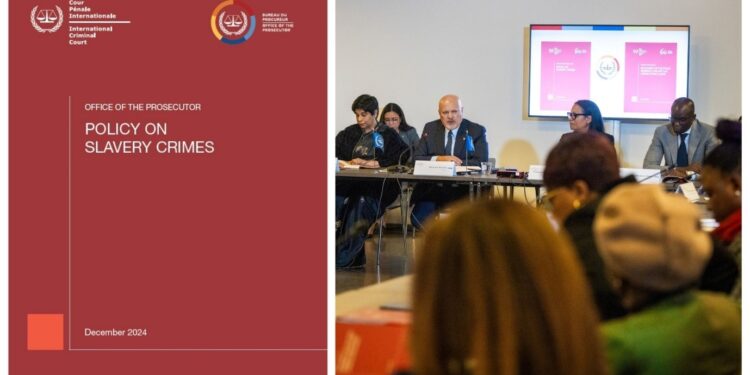In acknowledgement of the need to address increasing cases of slavery crimes, the International Criminal Court (ICC) has launched a new policy to guide it in investigating and prosecuting enslavement and sexual slavery under the Rome Statute.
ICC Prosecutor Karim A.A. Khan unveiled the Policy on Slavery Crimes, which he said was the first of its kind to be issued by an international court or tribunal, during the 23rd session of the Assembly of States Parties (ASP) in The Hague, the Netherlands. The launch coincided with the International Day for the Abolition of Slavery and draws attention to the continuing prevalence of slavery crimes worldwide.
“While slavery crimes have a long history, they, unfortunately, are not a thing of the past,” said Khan in a statement dated December 2, 2024, adding that the new policy will enhance the ICC’s ability to achieve accountability for slavery crimes by providing clear guidelines and principles.
The statement explains that the policy sets out the scope of slavery crimes under the Rome Statute and will guide the Office of the Prosecutor (OTP) to “properly investigate and prosecute the full character of enslavement and sexual slavery as crimes against humanity, and sexual slavery as war crimes.
Slavery crimes, including enslavement, sexual slavery, and the slave trade, are some of the gravest violations of human rights. Although various legal systems across the globe have long recognised these crimes, the ICC has faced criticism for not prioritising such cases.
Germain Katanga of the Democratic Republic of the Congo (DRC), for instance, was acquitted of the charges of rape and sexual slavery, although he was found guilty as an accessory to one count of crimes against humanity (murder) and four counts of war crimes (attacks against a civilian population, murder, destruction of enemy property, and pillaging). Similarly, in the Al Hassan Ag Abdoul Aziz Ag Mohamed Ag Mahmoud case, the ICC acquitted the Mali national of gendered violence, saying that although the crimes of rape and sexual slavery, and forced marriages, occurred when he was the chief of police, he could not be directly connected to them.
These acquittals highlight the challenges the ICC has struggled with, particularly in obtaining sufficient evidence and witness testimony. However, the court has acknowledged these crimes, as seen in the Bosco Ntaganda case in the Democratic Republic of the Congo (DRC) situation, in which it recognised sexual slavery as both a war crime and a crime against humanity. The Dominic Ongwen case in Uganda brought convictions for similar offences.
ALSO READ: ICC Prosecutor seeks arrest warrant for Myanmar leader
Khan acknowledged that slavery crimes can take myriad forms and explained that the policy will apply to all facets of the OTP’s work, “from preliminary examinations, investigations, confirmation of charges, trial, sentencing, appeal and reparations”.
The Rome Statute, which governs the ICC’s jurisdiction, classifies enslavement and sexual slavery as crimes against humanity under Article 7 and as war crimes under Article 8. However, the ICC’s mandate does not cover historical slavery predating 2002, a limitation tied to its statute.
According to the policy’s guidelines, slavery crimes can also intersect with other Rome Statute crimes. These crimes are often gender-based and can overlap with crimes against and affecting children.
The OTP explains on the ICC website that under certain circumstances, contemporary manifestations of these crimes, such as “conduct or acts of trafficking, forced labour and reducing a person to servile status, child soldiers, forced marriages, child brides, child labour, labour of persons with disabilities” may constitute slavery crimes when they meet the criteria set out in the Rome Statute.
Survivor-Centered and Trauma-Informed Approach
A key aspect of the new policy is its focus on a survivor-centred and trauma-informed approach. Prosecutor Khan highlighted the importance of understanding the lived experiences of survivors, stating that his office approaches the prosecution of these crimes with an “emphasis on survivor-centred and trauma-informed approaches, intersectionality, gender- and child-competent practices, contextualisation, and full and faithful characterisation”.
The document also seeks to dispel misconceptions about contemporary slavery while situating such crimes in their historical and cultural contexts. It highlights the systemic nature of these crimes and their far-reaching impact on individuals and communities.
“Slavery or enslavement is committed whenever there is an exercise of powers attaching to the rights of ownership over one or more persons,” Khan explained, noting that the policy will enhance his office’s work in seeking justice for victims of these crimes whether committed during armed conflict or as part of crimes against humanity or genocide.
“I hope that it will significantly contribute to the progressive development of the international jurisprudence and best practices to further accountability, redress and non-repetition of slavery crimes,” Khan added.
The statement said the policy aligns with the court’s 2024 Policy on Complementarity and Cooperation. It encourages collaboration with states and other accountability mechanisms to close impunity gaps and foster coordinated efforts to hold the perpetrators of slavery crimes accountable.
It is also harmonised with the 2022 Policy on the Crime of Gender Persecution, the 2023 Policy on Gender-Based Crimes, the 2023 Policy on Children, and other relevant OTP guidance, to allow for comprehensive and consistent approaches to its work.
The Prosecutor said the policy was produced through a consultation process led by the Special Adviser for Slavery Crimes, Prof Patricia V. Sellers, supported by Deputy Prosecutor Nazhat Shameem Khan. Input was gathered from more than 150 external experts across 50 countries, survivor communities, civil society organisations, academics, national authorities, international organisations, and investigative mechanisms.
The OTP said it received over 50 written submissions from 24 countries during the consultation, highlighting the collaborative nature of the initiative.







